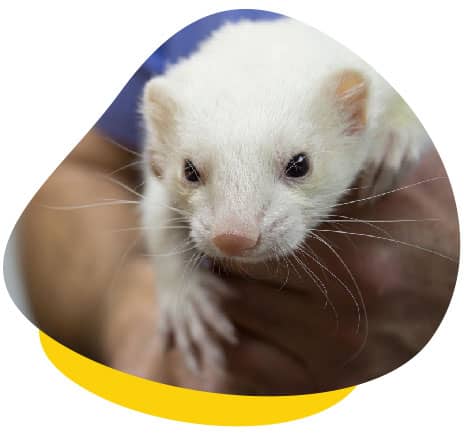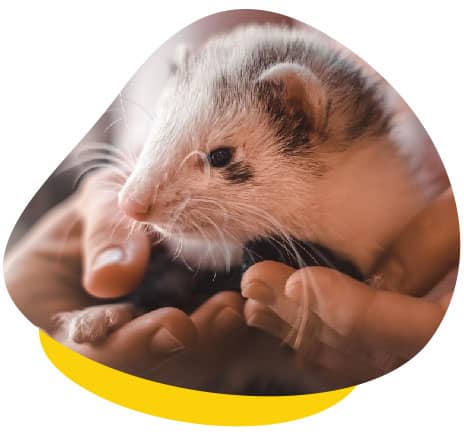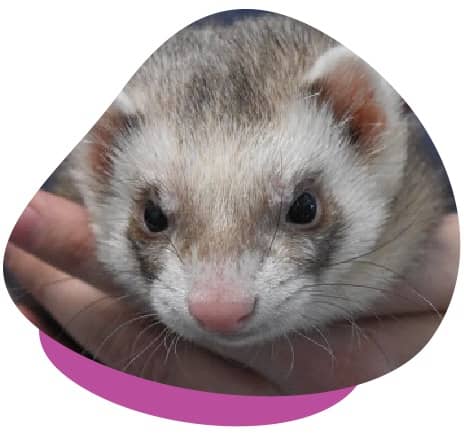Sterilisation (or desexing) is when animals have surgery to remove part of their reproductive tract, making them unable to breed. This procedure is often overlooked in small pet mammals, such as rabbits, guinea pigs, ferrets and rats.
This article discusses the advantages and disadvantages of desexing in ferrets, and why surgical desexing may not be the best option for every ferret.

Should I Desex My Ferret?
Sterilisation in both males and females can reduce the strong musk-like odour of many ferrets, as well as preventing life-threatening conditions in female ferrets.
Up to 50% of female ferrets are unable to come out of heat (oestrus) without being mated, and this can lead to toxic levels of oestrogen building up in their system. In some cases, this can cause fatal anaemia to develop.
What Are the Different Types of Sterilisation?
The most common form of sterilisation is when an animal undergoes surgery to remove part of their reproductive tract. However, in ferrets, there is a medical approach to sterilisation. This is temporary but can last 1-2 years depending on the individual ferret’s response.
In ferrets, these medical alternatives have some benefits over surgical desexing and are recommended for many ferrets, particularly those under the age of 2 years.

Is Surgical or Medical Sterilisation Better for My Ferret?
Surgical desexing in ferrets is considered a routine procedure and removes parts of the reproductive tract that can be prone to developing tumours later in life. However, like any procedure involving general anaesthesia, there are some risks.
Medical sterilisation avoids the risk of a longer general anaesthetic and can sometimes be given in conscious ferrets. This involves a small implant being placed between your ferret’s shoulders under the skin. The implant is known as Suprelorin (Deslorelin) and is a widely available medication in Australia, due to its use in dogs.
The main advantage of medical sterilisation is that it reduces the risk of adrenal disease developing in ferrets.

What is Adrenal Disease in Ferrets?
Adrenal disease is a term used to describe a change to the adrenal glands, which can be cancerous. This has been linked to early surgical sterilisation in ferrets, particularly those that are desexed before six months of age. Medical forms of sterilisation avoid the risk of adrenal disease by leaving the ovaries and testicles in place.
What if I Choose Not to Sterilise My Ferret?
Whichever form of sterilisation you choose, it is still recommended to get your ferret sterilised for several reasons:
- Many female ferrets (approximately 50%) are unable to come out of heat (oestrus) without a vasectomised or entire male present. If jills stay in heat, they can develop a condition known as oestrogen toxicity, which causing life-threatening anaemia. Desexed ferrets do not develop this problem.
- Whilst both male and female ferrets both have a characteristic smell, it is the entire male ferrets that are known for their stronger, more pungent odour. Both surgical and medical sterilisation can significantly reduce this smell.
- Sterilisation can also reduce certain behaviours such as aggression and urine marking.
What is the difference in cost between medical and surgical sterilisation?
The cost of each is similar. The main advantage of surgical sterilisation is that it is a one-off cost, whereas the suprelorin implant needs to be repeated every 12-18 months.

Summary
| Surgical Sterilisation | Medical Sterilisation (Suprelorin) | |
| Is an anaesthetic required? | Yes | In some cases – depends on the ferret |
| Does it need to be repeated? | No | Yes, every 1-1.5 years |
| Does it work for both sexes? | Yes | Yes |
| Is the procedure linked to a potentially higher risk of adrenal disease developing in later years? | Yes | No |
| Does it prevent pregnancy? | Yes | Yes |
| Does it prevent reproductive diseases such as tumours? | Yes | No |
Where Can I Get More Information on Ferret Desexing?
The Unusual Pet Vets are available to provide information by email, phone call or by booking an appointment with us.

